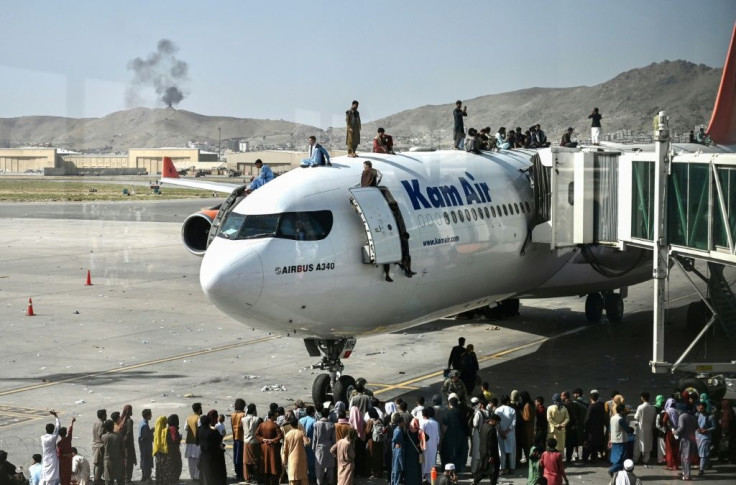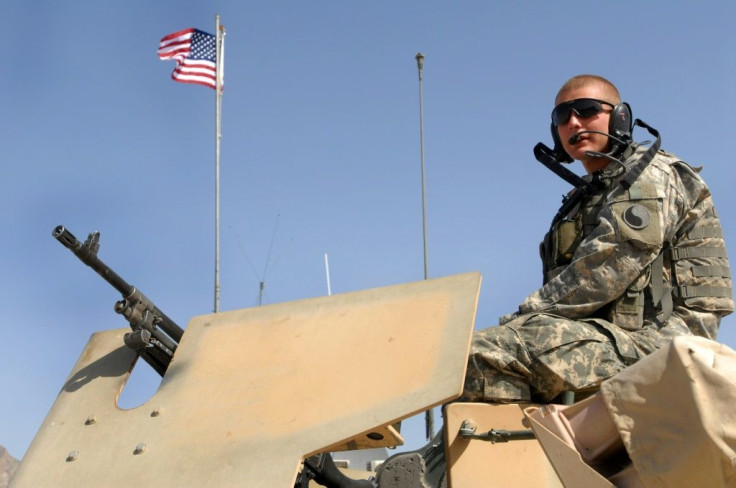‘We Will See Al Qaeda 3.0:’ Lawmaker Issues Dire Warning On Afghanistan

KEY POINTS
- Mike Waltz, R-Fla., said what comes next is “Al Qaeda 3.0”
- Al Qaeda plotted 9/11 attacks in Taliban-ruled Afghanistan 20 years ago
- Kabul fell to the Taliban over the weekend
- Biden rejected blame for the fast-paced collapse of the Afghan government
- Critics have called for more U.S. action in helping Afghans who want to escape the chaos
Rep. Mike Waltz, R-Fla., warned Monday that the United States will experience another attack from Al Qaeda, and terrorism against the country will rise following the Biden administration’s move of pulling American forces out of Afghanistan.
In an interview with CNBC’s “The News with Shepard Smith,” Waltz said terrorism out of Afghanistan does not only stay in the troubled country but spreads to other areas. “We will see Al Qaeda 3.0, they are working closely with the Taliban, and they do intend to attack America again,” he said.
The U.S. has gone after Al Qaeda following the 9/11 terror attacks, invading Afghanistan where the terror organization had a safe haven, and hunting down its leaders including Osama Bin Laden in his hideout in Pakistan. The Taliban never really broke off their contacts with Al Qaeda, and U.S. and world officials fear the organization will reconstitute in a Taliban-controlled Afghanistan.
Waltz said American credibility has been “seriously damaged” after President Joe Biden announced in April that U.S. troops will be completely out of Afghanistan before Sept. 11. He pointed out that Afghanistan was the only country that had agreed to host American troops as part of the efforts to stay protected against terrorists.
Al Qaeda 3.0 will emerge from the aftermath of this reckless withdrawal. The same Obama foreign policy team (Blinken, Austin, Sullivan) oversaw the pullout of Iraq and the rise of ISIS are responsible for this disaster. Americans deserve to see accountability and resignations pic.twitter.com/woVKbVDobs
— Rep. Mike Waltz (@michaelgwaltz) August 17, 2021
Last week, British defense secretary Ben Wallace said that the Taliban's regaining control of Afghanistan would trigger the rise of other militant groups. "Al Qaeda will probably come back," Wallace warned, noting that extremist groups particularly take interest in "failed states" such as Afghanistan. He referred to the U.S. walkout from a country that it had helped strengthen and protect for two decades.
Waltz’s comments came a day after the Afghan capital of Kabul fell into the hands of the Taliban. There was little resistance from Afghan military forces and Afghanistan’s President Ashraf Ghani left the country as the Taliban celebrated their victory.
More than 600 Afghans trying to escape the Taliban crowded into a U.S. Air Force C-17 for evacuation from Kabul to Qatar on Sunday — nearing the record for most people ever flown in the Boeing cargo plane.
— CBS News (@CBSNews) August 17, 2021
📸: Defense One pic.twitter.com/v6r0DvG8lu
Thousands of U.S. citizens are trapped in Kabul with no ability to get to the airport. As Taliban soldiers go door to door, searching for Westerners, these U.S. citizens are now reaching out to Washington for help. https://t.co/0DfEcbrPyt
— Josh Rogin (@joshrogin) August 16, 2021
The U.S. State Department confirmed late Sunday that all embassy personnel in Kabul have since been evacuated out of the chaotic Kabul airport. The Taliban also released a statement ensuring civilian safety. “Our forces are entering Kabul city with caution,” the statement said.
On Monday, Biden refused to take the blame for Kabul’s fall, reiterating that the Afghan forces backed by U.S. military equipment and troops over the past 20 years “failed” to prepare for a civil war against the Taliban. “I stand squarely behind my decision,” a defiant Biden declared although he did admit that the collapse of the Afghan government came faster than initially expected.
Biden defends handling of Afghanistan as the Taliban seizes Kabul.
— USA TODAY (@USATODAY) August 16, 2021
Read more: https://t.co/zrRk3yH1ap pic.twitter.com/I8XGW36QD6
Biden administration's critics have since called on the government to take action in helping refugee Afghans who were trying to flee their embattled country. Rep. Jason Crow, D-Colo., said evacuations for fleeing Afghans “could have been done deliberately and methodically” over the past few months while anticipating the pullout of U.S. troops.
A statement from Amnesty International previously said that the Biden administration’s decisions “only fanned the flames of this humanitarian catastrophe,” the National Public Radio reported. The United Nations Security Council also called for “inclusive negotiations” on rebuilding an Afghan government that will protect the Afghan public, especially women, whose rights and education are hanging in the balance following the Taliban’s takeover.

© Copyright IBTimes 2025. All rights reserved.




















